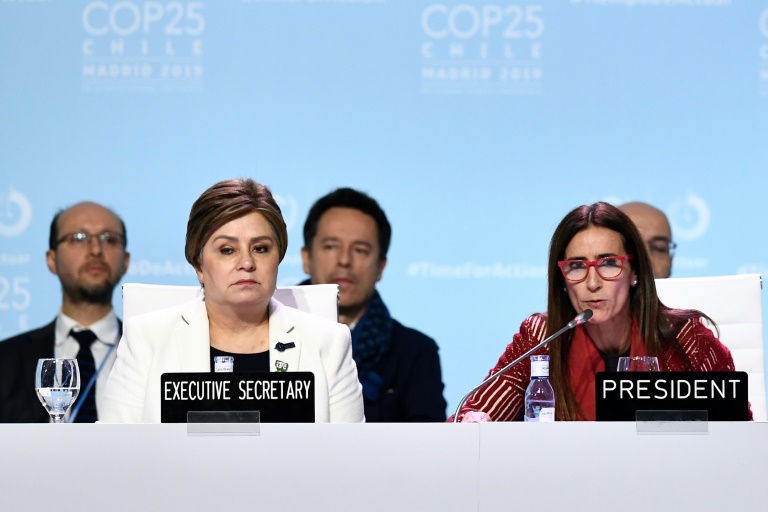
Madrid negotiators agreed on the "urgent need" for new carbon cutting commitments -- but for UN chief Antonio Guterres, the summit was a "lost opportunity". (Photo: AFP)
A major climate summit wrapped up in Madrid Sunday with a compromise deal that left little to show, prompting UN Secretary-General Antonio Guterres to lament a "lost opportunity" to act.
Almost a fortnight of COP25 talks just squeezed out hard-earned compromises from countries over a global warming battle plan that fell well short of what science says is needed to tackle the climate crisis.
"I am disappointed with the results of COP25," Guterres said. "The international community lost an important opportunity to show increased ambition on mitigation, adaptation and finance to tackle the climate crisis."
The summit's final declaration "expresses the urgent need" for new carbon cutting commitments to close the gap between current emissions and the Paris treaty goal of capping temperature at below two degrees Celsius, said host country Spain.
"Today, the citizens of the world are asking for us to move ahead faster and better," Carolina Schmidt, Chilean environment minister and President of COP25, told the closing plenary.
But Tina Eonemto Stege, climate envoy for the Marshall Islands, denounced the response as inadequate for facing an existential threat of rising sea levels.
"Unfortunately, the new text we adopted this morning does not reflect anything near what we would have wanted. It is the bare minimum and we regret that countries could not agree on a more ambitious text," Stege said.
Major players 'did not deliver'
Following a year of deadly extreme weather and weekly protests by millions of young people, Madrid negotiators were under pressure to send a clear signal that governments were willing to double down.
The summit -- moved at the last minute from Chile due to unrest -- was at times close to collapse as rich polluters, emerging powerhouses and climate-vulnerable nations groped for common ground in the face of competing national interests.
Negotiators from nearly 200 nations came to Spain's capital with the aim of finalising the rulebook for the 2015 Paris accord, which enjoins nations to limit global temperature to below two degrees Celsius (3.6 Fahrenheit).
"Major players who needed to deliver in Madrid did not live up to expectations," said Laurence Tubiana, CEO of the European Climate Foundation and, as France's top negotiator, a main architect of the Paris Agreement.
"But thanks to a progressive alliance of small island states, European, African and Latin American countries, we obtained the best possible outcome, against the will of big polluters."
Brazilian President Jair Bolsonaro however blamed the rich nations.
"I'd like to know: has there been a resolution for Europe to be reforested, or are they just going to keep bothering Brazil?" he said Sunday, speaking from his country.
Bolsonaro has been widely criticised for easing restrictions on exploiting the Amazon's vast riches, leading to an acceleration in deforestation there.
'Missing in action'
With the accord set to become operational next year, campaigners had hoped that protests, irrefutable science, and deadly storms and wildfires that marked 2019, would move governments to redouble their efforts at COP 25.
But that greater ambition largely failed to materialise, leaving some veteran observers aghast.
"Most of the world's biggest emitting countries are missing in action and resisting calls to raise their ambition," said Alden Meyer, director of strategy and policy at the Union of Concerned Scientists and a 28-year veteran of the climate process.
The push for strengthening voluntary carbon cutting plans is led by small-island and least-developed states, along with the European Union.
These have called out nations they see as blocking consensus -- notably the United States, Australia and Saudi Arabia.
China and India, the world's No. 1 and No. 4 carbon emitters, made it clear they saw no need to improve on their current emissions reduction plans, which run to 2030.
These emerging giants chose instead to emphasise the historical responsibility of rich nations to lead the way and provide financing to poor countries.
'Loss and damage'
The summit was also meant to finalise a chapter on carbon markets in the Paris rulebook.
Instead, the focus now switches to next year's COP 26 in Glasgow, when the true Paris deadline falls.
The US, which is leaving the Paris deal next year, was accused of playing spoiler on a number of issues.
This included so-called "loss and damage" funding to help disaster-hit countries repair and rebuild.
"The US has not come here in good faith," said Harjeet Singh, climate lead with charity ActionAid.
"They continue to block the world's efforts to help people whose lives have been turned upside down by climate change."
Even if all countries implement their current plans under Paris, Earth is on course to warm more than 3C by 2100.
Swedish youth activist Greta Thunberg -- named 2019 Person of the Year by Time magazine -- on Friday slammed world leaders for "still trying to run away from their responsibilities" while demanding a "year of action" in 2020.


